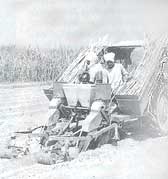Hands off the cane
 GROWING sugar cane is a tedious affair. It takes a back-breaking 3 days to plough, furrow, plant, apply fertilisers and pesticides and cover the furrows in 1 ha. And because the furrows and planted stalk cuttings, also known as cane sets, are left exposed to the elements, they lose moisture, which is necessary for early germination.
GROWING sugar cane is a tedious affair. It takes a back-breaking 3 days to plough, furrow, plant, apply fertilisers and pesticides and cover the furrows in 1 ha. And because the furrows and planted stalk cuttings, also known as cane sets, are left exposed to the elements, they lose moisture, which is necessary for early germination.
Now, however, Indian sugarcane cultivators can have their work vastly simplified, thanks to a mechanical cane planter developed by A C Srivastava, an engineer at the Lucknow-based Indian Institute for Sugarcane Research (IISR). The machine is a factotum that does everything, including cutting cane stalks into sets.
The machine grabs cane stalks with cushioned rollers and cuts them into sets. Although there are chances of buds getting damaged, Srivastava says the number of buds damaged does not exceed 3 per cent. The sets pass through a chute into the furrow, after which fertilisers and insecticides are sprayed through 2 nozzles. The machine then covers up the furrows, compacting the soil with a roller. Because the covering takes place immediately after the fertilisers and insecticides are sprayed, the loss of moisture is almost absent. This brings down set mortality by about 10 per cent and facilitates germination at least a week earlier.
The cost of operating the mechanised planter is 40 per cent less than manual planting. With only 4 workers -- the tractor driver, 2 persons to supervise the feeding of the canes into the cutter and the spraying of insecticides and fertilisers and 1 person to refill stocks of fertilisers and insecticides -- the mechanical planter can wrap up sowing on 1 ha in just 4 hours.
Says Srivastava, "I wanted to offer the design to any public sector agricultural equipment manufacturer. None, however, evinced any interest so far." The Tractor and Farm Equipment (TAFE) will soon undertake commercial production of the planter. So far, more than 70 customers have indicated they want to buy the device. Requests have also poured in from Malaysia, Fiji, Pakistan, Bangladesh, Peru and Hawaii.
Meanwhile, Meerut-based entrepreneur Malkait Singh Dhol has reverse-engineered the device and is all set to market a crude imitation of the machine. Dhol claims his machine is the product of 4 years of research.
